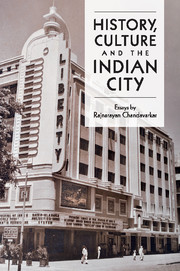Book contents
- Frontmatter
- Contents
- Acknowledgements
- Publisher's note
- Introduction by Dr Jennifer Davis, Wolfson College, University of Cambridge
- Bombay's perennial modernities
- Sewers
- Peasants and proletarians in Bombay city in the late nineteenth and early twentieth centuries
- State and society in colonial India
- Religion and nationalism in India
- From neighbourhood to nation: the rise and fall of the Left in Bombay's Girangaon in the twentieth century
- Historians and the nation
- Urban history and urban anthropology in South Asia
- Aspects of the historiography of labour in India
- Postscript by Professor David Washbrook, Trinity College, University of Cambridge
- Bibliography of the published works of Rajnarayan Chandavarkar
- Index
- References
Postscript by Professor David Washbrook, Trinity College, University of Cambridge
Published online by Cambridge University Press: 17 March 2010
- Frontmatter
- Contents
- Acknowledgements
- Publisher's note
- Introduction by Dr Jennifer Davis, Wolfson College, University of Cambridge
- Bombay's perennial modernities
- Sewers
- Peasants and proletarians in Bombay city in the late nineteenth and early twentieth centuries
- State and society in colonial India
- Religion and nationalism in India
- From neighbourhood to nation: the rise and fall of the Left in Bombay's Girangaon in the twentieth century
- Historians and the nation
- Urban history and urban anthropology in South Asia
- Aspects of the historiography of labour in India
- Postscript by Professor David Washbrook, Trinity College, University of Cambridge
- Bibliography of the published works of Rajnarayan Chandavarkar
- Index
- References
Summary
A recurring concern of the essays is the history of labour but, as Jennifer Davis notes in her Introduction, Raj never saw himself as a labour historian. He viewed society, culture and politics in their widest terms and on the basis of a stunning breadth of reading, and he was never afraid to engage with contemporary issues in the course of exploring the past. However, his perspective was firmly rooted to a particular point, revealed in a phrase which occurs on several occasions in these essays: that a society is to be judged by how it treats its poorest and weakest members. It is hard to argue with that judgement.
The essays take up many discrete questions, but Raj delighted in debate and came back repeatedly to three sets of issues where he hoped that his interventions would be telling. The first of these concerned the status of universal social theories and, especially, the theory of ‘modernization’. Raj entered academic life in the 1970s when the optimism which had attended the ‘liberation’ of the former European colonies was already beginning to dissipate. Naively, it had been supposed that, freed from their colonial shackles, they would rapidly ‘develop’ along the same course as the societies of their erstwhile masters – towards liberty, prosperity and democracy, which represented the ineluctable destiny of the whole of humankind. And, in so far as they did not, it was the result of failings within themselves, peculiarities which ‘obstructed’ or ‘arrested’ their passage to progress.
- Type
- Chapter
- Information
- History, Culture and the Indian City , pp. 251 - 259Publisher: Cambridge University PressPrint publication year: 2009



